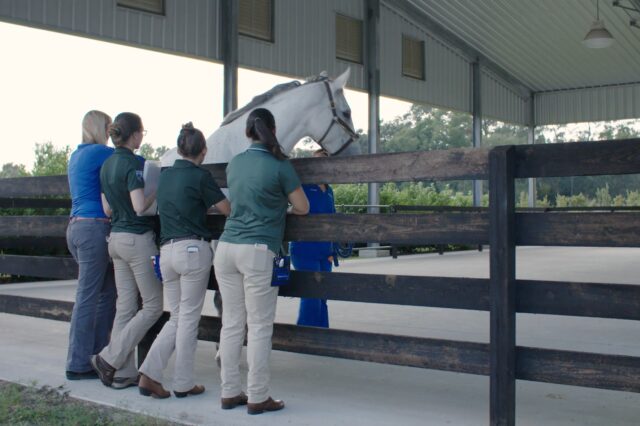UF spearheads initiative to improve veterinary medical teaching

 An initiative spearheaded by the University of Florida College of Veterinary Medicine aims to advance teaching excellence in academic veterinary medicine through a new regional consortium.
An initiative spearheaded by the University of Florida College of Veterinary Medicine aims to advance teaching excellence in academic veterinary medicine through a new regional consortium.
“Many people might not know that when faculty come to a veterinary school, they’re often teaching their trade and may not know the most effective way of sharing their knowledge,” said Juan Samper, D.V.M., the college’s associate dean for academic and student affairs. “Our goal is to address this by combining the mindset of professional veterinarians with that of teachers.
To that end, the college has formed the Southeast Veterinary Educational Consortium as a way to encourage collaboration among faculty with teaching duties at veterinary medical colleges located in the eastern United States. Another similar consortium already serves veterinary colleges in the western U.S., Samper said.
“We have excellent instructors, but the veterinary program has so many facets as to what is required of teachers,” Samper said. “It’s different to teach in the classroom than in clinics, as it’s different to teach residents than it is to teach veterinary students. There are lots of levels of teaching and we need to address this and make sure we excel in all these facets.”
Joining UF as participants in the consortium will be the Virginia-Maryland Regional College of Veterinary Medicine and the veterinary medicine colleges at North Carolina State University, Lincoln Memorial University, the University of Georgia and the University of Tennessee.
The consortium’s member institutions will collaborate to develop, evaluate, implement and share best practices in veterinary medical education and will promote excellence in education toward promotion and tenure at their different institutions.
“The University of Georgia College of Veterinary Medicine is excited to participate in this consortium, which will offer a myriad of opportunities for our faculty to learn from one another across member institutions,” said Scott Brown, V.M.D., Ph.D., associate dean for academic affairs and the Josia Meigs Distinguished Professor at the college.
“In addition, the consortium will allow us to enhance career development among our faculty, ultimately benefitting our students and the society they will serve,” he added.
Samper came up with the idea during a professional meeting earlier this year, at which many of his academic peers from other college were in attendance.
“I just started to think we need to enhance our existing teaching efforts at UF and really try to broaden these efforts to collaborate with our peer institutions on the East Coast,” he said.
Samper subsequently initiated communication with deans from other colleges, and saw there was mutual interest. UF pledged an initial sum in seed money, which was subsequently supplemented by commitments from the consortium members.
An initial meeting is anticipated for 2019, Samper said, adding that he envisions annual meetings would be held subsequently at different institutions, focusing on how to better support faculty in their educational academic initiatives.
“We veterinarians don’t get taught how to teach,” he said. “We come in trying to emulate the great teachers we had, but in these changing times, technology is affecting the way we do things. The newer generations have a different way of learning, and we need to think about how we as educators adapt to these different learning styles.
The University of Florida College of Veterinary Medicine is supported through funding from UF Health and the UF Institute of Food and Agricultural Sciences.
About the author
